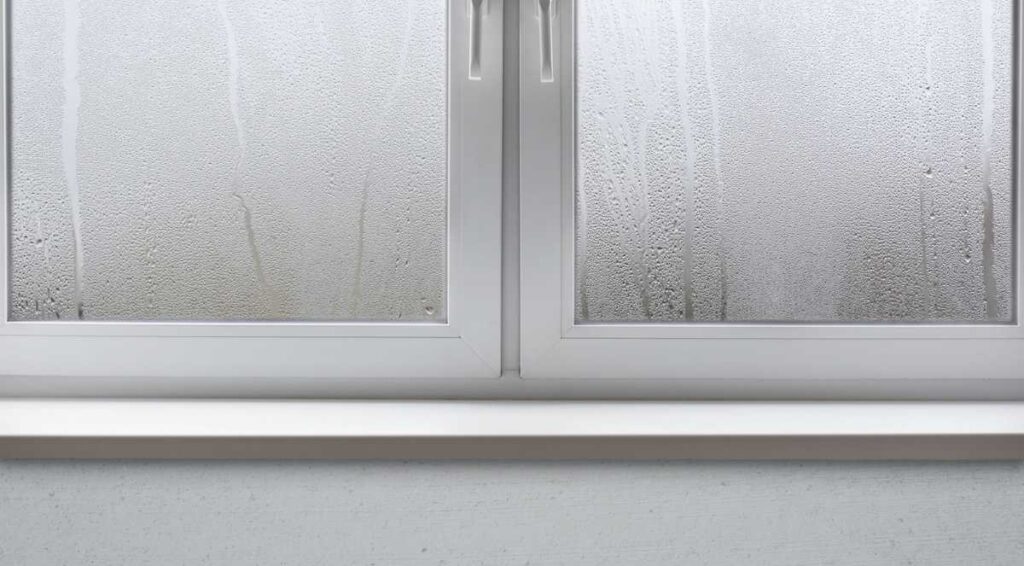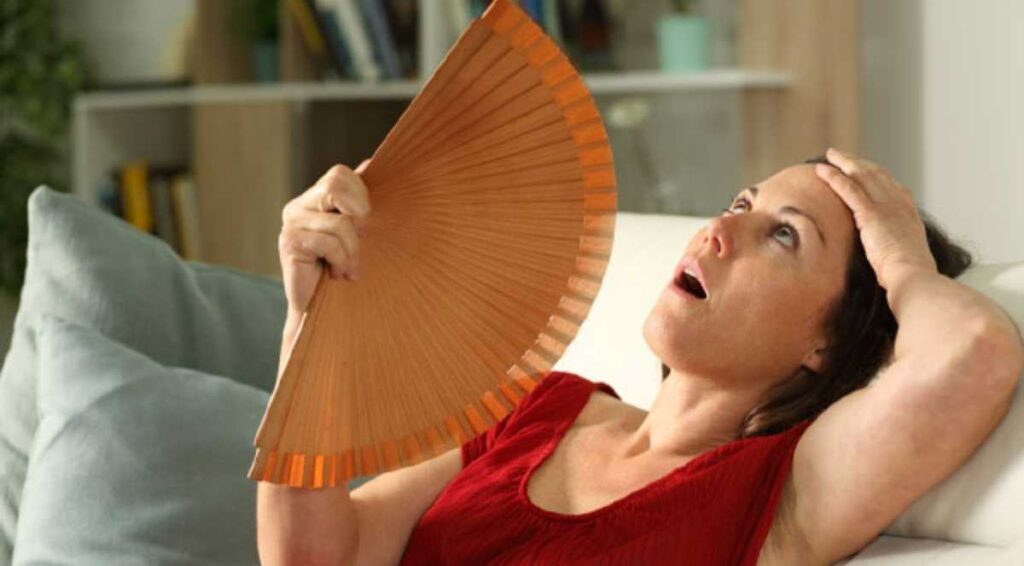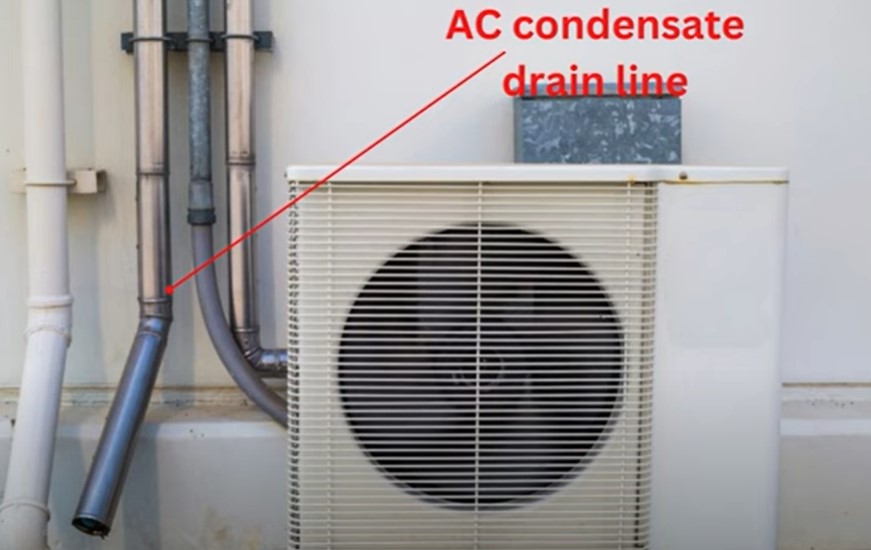Yes, it is possible for your house to feel humid even with the AC on. The reason for this is that your AC may not be properly sized for your home or there could be an issue with your AC system such as a clogged filter or a malfunctioning condenser.
When your AC unit is not functioning properly, it may not be able to effectively remove moisture from the air. Additionally, if your home is not properly insulated, it can allow humidity to seep in and make it difficult for your AC unit to maintain a comfortable humidity level.
As a result, it is important to have your AC unit inspected regularly to ensure it is functioning efficiently and to properly insulate your home to prevent excess humidity.

Why Is My House So Humid With The AC On? Reveal the Reasons
There are a few reasons why your home may be more humid than normal, even with the air conditioner running. One possibility is that your air conditioner is too small for the space it is trying to cool. If your air conditioner is too small, it will run constantly but not be able to lower the humidity in your home effectively.
Another possibility is that your air conditioner is not properly sized for your home and is not removing enough moisture from the air. Finally, your home may have a leaky duct system that is allowing humid air to enter your home. If you have a leaky duct system, it is important to have it repaired as soon as possible to prevent further damage to your home and to improve the efficiency of your air conditioner.
There are a few reasons why your house may be feeling more humid than usual, even with the air conditioning running. It could be that your AC unit is too small for the space it’s cooling, or that it’s not properly sized for your home’s layout. Additionally, if your unit isn’t properly maintained, it could be causing the problem.
Finally, your home’s location could be to blame. If you live in a climate with high humidity, it’s going to be more difficult to keep your home feeling comfortable.
If you’re not sure why your home is so humid, it’s best to call in a professional.
They can help you troubleshoot the problem and find a solution that will work for you. In the meantime, there are a few things you can do to help improve the situation. Make sure you’re using a humidifier in your home, and try to keep your AC unit’s filter clean.
These simple steps can make a big difference in the level of humidity in your home.
Ac is cooling but not removing humidity
If you have an AC unit that is cooling but not removing humidity, there are a few possible reasons. First, check to see if the AC unit is the proper size for the space. If the unit is too small, it will not be able to effectively remove the moisture from the air.
Second, check the air filter and make sure it is clean. A dirty filter will prevent the AC unit from working properly. Finally, check the AC unit’s coils.
If they are dirty, they will not be able to remove the moisture from the air.
Why is my room so humid at night?
If you’ve ever woken up in the middle of the night feeling like you’re swimming in your own sweat, you’re not alone. Many people experience increased humidity levels in their bedrooms at night, and there are a few reasons why this might be the case.
One common reason for increased humidity at night is the presence of a humidifier in the room.
While humidifiers can be great for adding moisture to the air and alleviating dry skin and sinuses, they can also contribute to increased humidity levels if they’re not used properly. If you have a humidifier in your room, make sure to clean it regularly and use it sparingly to avoid raising the humidity too much.
Another reason your room might be extra humid at night is because of your body temperature.
When we sleep, our body temperature naturally decreases, and this can cause the air around us to feel more humid. If you find that you’re extra sweaty at night, it might be worth considering investing in a cooling mattress pad or sleeping on breathable sheets to help regulate your body temperature.
Finally, if your home is located in a particularly humid climate, that could be why your room feels extra muggy at night.
If you live in an area with high humidity, it’s important to use a dehumidifier in your home to help keep the air dry and comfortable.
Why is my house so humid all of a sudden?
If you’re noticing an uptick in the humidity levels in your home, there are a few potential culprits. First, take a look at the weather outside. If it’s been unusually humid lately, that could be the reason your home feels more muggy than usual.
But even if the weather hasn’t been especially humid, there are still a few things that could be causing the issue. One possibility is that your home isn’t properly ventilated. This can be a problem in homes that are sealed up tightly to conserve energy.
Without proper ventilation, humid air can get trapped inside, leading to an increase in the overall humidity levels. Another possibility is that you have a problem with your HVAC system. If your air conditioner is on the fritz, it could be causing the humidity levels to rise.
In some cases, you may need to have your AC unit repaired or replaced. If you’re not sure what’s causing the humidity problem in your home, it’s a good idea to call in a professional. An experienced HVAC technician can take a look at your system and help you determine the best course of action.

House Is Humid with AC On – How to Get Rid of It?
If your house is still humid despite running your air conditioner, there may be a few solutions to consider. Here are some tips to get rid of excess humidity in your home:
- Check your AC’s settings to make sure it’s properly set to dehumidify
- Check and clean your AC’s filters to make sure they’re not clogged with dust and debris
- Consider using a dehumidifier in addition to your AC
- Make sure your home is properly sealed to prevent moisture from entering
- Use exhaust fans in bathrooms and kitchens to remove excess moisture
- Consider having a professional HVAC technician inspect your AC unit to ensure it’s functioning properly.
By following these tips, you should be able to reduce the humidity in your home and create a more comfortable living environment.
How to decrease humidity in house?
If you live in a humid climate, you know how uncomfortable it can be to have too much moisture in the air. High humidity can cause a variety of problems, from condensation on your windows to musty-smelling rooms and even health problems. Luckily, there are a few things you can do to decrease the humidity in your home and make it more comfortable.
One of the most effective ways to decrease humidity is to use a dehumidifier. Dehumidifiers work by pulling moisture out of the air and storing it in a reservoir. You can then empty the reservoir when it gets full.
Dehumidifiers can be used in different sized rooms, and you can even get portable ones that can be moved from room to room.
Another way to decrease humidity is to ventilate your home. This can be done by opening windows and doors to let air circulate.
If you have an air conditioner, you can also use the “fan only” setting to help circulate the air.
You can also decrease humidity by making sure there is no standing water in your home. This means fixing any leaks, and not letting water accumulate in places like sinks, showers, and tubs.
You should also empty any unused containers that may be holding water.
Finally, you can decrease humidity by using a humidistat. This is a device that measures the amount of moisture in the air.

Room is cold but humid
If you find yourself in a room that is cold but humid, it is likely because the air conditioning is not working properly. This can be a very uncomfortable situation, as the humidity can make it feel much colder than it actually is. If you are able to, you should try to find a way to adjust the temperature so that it is more comfortable.
If you can’t do that, there are a few things you can do to try to make the situation more bearable.
First, make sure you are dressed appropriately for the temperature. Wear layers of clothing so that you can remove them if you start to feel too cold.
It is also important to stay hydrated, as dehydration can make you feel colder. Drink plenty of fluids and avoid alcohol, as it can actually make you feel colder.
If you can, try to find a way to block the drafts in the room.
Hang a blanket over the door or put a towel at the bottom of the door to help keep the cold air out. You can also try to use a space heater to help warm up the room. Just be sure to keep it away from any flammable objects and never leave it unattended.
Making the best of a cold, humid room can be challenging, but hopefully these tips will help make it more bearable.
High humidity in house after rain
If you’ve ever stepped outside after a rainstorm and felt like the air was almost too thick to breathe, you know what high humidity feels like. And if you’ve ever gone into your house after a rainstorm and felt like you were stepping into a sauna, you know what high humidity in your house feels like!
High humidity in your house can be caused by a number of things, but the most common culprit is rain.
When rain falls, it saturates the air with water vapor. This water vapor then seeps into your house through cracking and openings, raising the humidity inside.
If you live in an area that gets a lot of rain, you’re probably used to high humidity in your house.
But if you’re not used to it, it can be quite a shock! High humidity can make your house feel muggy and stuffy, and it can also cause condensation on your walls and windows.
If you’re not a fan of high humidity, there are a few things you can do to combat it.
First, try to keep your house as airtight as possible. This will help to prevent outside air from seeping in and raising the humidity levels. Second, use a dehumidifier to remove excess moisture from the air.
And finally, make sure to ventilate your house well, especially after cooking or showering, to help remove moisture from the air.
Signs of high humidity in home
If you suspect that the humidity in your home is too high, there are a few signs to look for. Excess humidity can lead to a musty smell in your home, as well as cause condensation on your windows. You may also notice that your wood furniture is warping or your wallpaper is peeling.
If you see any of these signs, it’s important to take action to lower the humidity in your home.
One way to lower the humidity in your home is to use a dehumidifier. Dehumidifiers work by pulling the moisture out of the air, which can help to reduce the amount of condensation in your home.
You can also try opening up your windows to allow for better air circulation. If you have an air conditioner, you can use it to help lower the humidity in your home as well. Just be sure to keep an eye on the humidity levels and make sure they don’t get too low, as that can also be detrimental to your home.
Does running the fan on my air conditioner reduce humidity?
If you’re like most people, you probably think that running the fan on your air conditioner will help to reduce humidity in your home. However, this is actually not the case. In fact, running the fan on your air conditioner can actually make the air in your home more humid!
Here’s why:
When the air conditioner is running, the evaporator coils are cold. This causes the water vapor in the air to condense on the coils.
The air conditioner then blows this air into your home, which increases the humidity.
So, if you’re looking to reduce the humidity in your home, it’s best to turn off the fan on your air conditioner. Instead, open a window or two to let some fresh, dry air into your home.
How do I lower the humidity in my house with AC?
If you want to lower the humidity in your house with your air conditioner, there are a few things you can do. First, you can set the temperature on your AC to a lower setting. This will cause the AC to run longer, which will help to remove more moisture from the air.
You can also set the AC to run on the “dry” or “dehumidify” setting, which will help to remove even more moisture from the air. Finally, you can place a bowl of water in front of the AC unit, which will help to absorb some of the moisture in the air.
Why my air conditioner is not lowering humidity in my home?
If your air conditioner is not lowering the humidity in your home, there are a few potential causes. One possibility is that the air conditioner is not sized correctly for the space. Another possibility is that the air conditioner is not operating at peak efficiency, which can be caused by a variety of factors including a dirty air filter or a lack of maintenance.
Additionally, the humidity level in your home can be affected by the humidity level outside, so if it is particularly humid outside, it may be more difficult to lower the humidity inside. There are a few things you can do to try to lower the humidity in your home, even if your air conditioner is not working as efficiently as it could be. One option is to use a dehumidifier, which can help to remove excess moisture from the air.
Another option is to use fans, which can help circulate the air and dry out any damp areas. Finally, you can try opening windows and doors to allow for better air circulation. If you have tried these things and the humidity in your home is still too high, it is possible that there is a problem with your air conditioner.
In this case, it is best to contact a professional for assistance.
Can AC make room humid?
Yes, AC can make room humid. When AC is turned on, it removes moisture from the air to cool it down. This can make the room feel humid.
Why is my house so humid with the AC on?
Conclusion
If your home feels humid even when the air conditioner is running, there are a few possible explanations. One possibility is that your AC unit is too small for the space it is trying to cool. Another possibility is that your home’s ductwork is leaky, which can cause humid air to seep in.
Finally, it’s possible that your air conditioner’s evaporator coils are frozen, which prevents the unit from properly dehumidifying the air. If you’re not sure what’s causing the problem, it’s a good idea to call a professional HVAC technician for help.